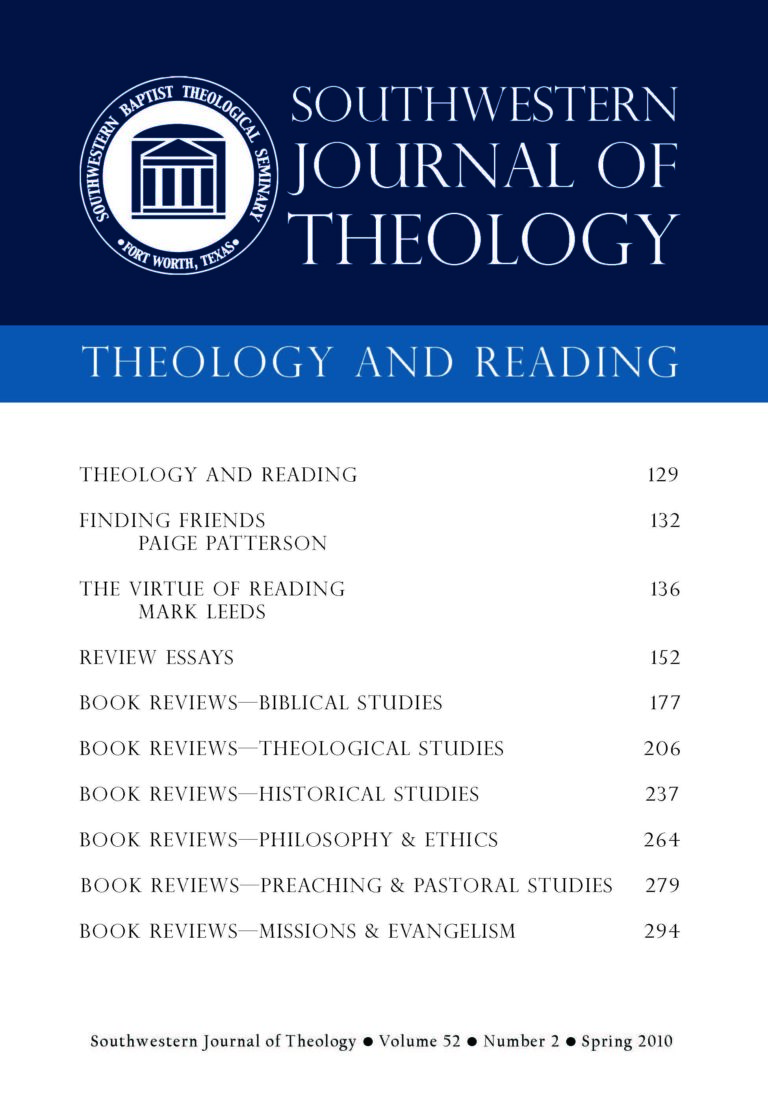
Theology and Reading
Southwestern Journal of Theology
Volume 52, No. 2 – Spring 2010
Managing Editor: Malcolm B. Yarnell III
2nd ed. Edited by William R. Yount. Nashville: B&H Academic, 2008. 464 + xvi pages. Hardcover, $39.99.
In the forward to the second edition of The Teaching Ministry of the Church, Darryl Eldridge, editor of the first edition, affirms the need for an updated version. He cites the “rise of Islamic fundamentalism, the proliferation of religious sects, and the secularization of our culture” (xi) as some of the factors necessitating a renewal and re-visioning of the local church’s calling to make disciples. First published in 1995, The Teaching Ministry of the Church set the standard for Christian education texts of the decade. The second edition has remained true to the essential message of the original, but has increased its relevance to the church of the twenty-first century.
Edited by William R. (“Rick”) Yount, the new edition is a collection of essays written by faculty members in the School of Church and Family Ministries at Southwestern Baptist Theological Seminary. Like its predecessor, this compilation reflects the work of “professor-practitioners who live and breathe the content they have written” (xvi). The first edition was written exclusively by faculty members in the Foundations of Education division and reflected a primary emphasis on the teaching-learning process. However, this new edition includes essays from faculty members in each division of the school, which integrates the experiences of leaders in foundations, administration, communications, human growth and development, and Christian counseling.
The primary strength of the book is in its development of a comprehensive discipleship-focused teaching ministry, concentrating on the essential elements: theological, historical, developmental, pedagogical, and organizational. Part One is a theological foundation for both the educational and organizational aspects of the teaching ministry. Part Two builds a strong biblical rationale for educational ministry, including a Trinitarian perspective, an ecclesiastical model, and a homebased process for making disciples. Part Three focuses on the practice of teaching, with an emphasis on methodological and developmental considerations. Part Four approaches Christian learning from an administrative context, featuring essays pertaining to making curriculum decisions, training and leading volunteers, organizing educational programs, and evaluating the teaching ministry.
The addition of chapters related to administrative concerns is a significant addition to the earlier book. One of the oft-repeated complaints of new pastors on the field is their lack of preparation in organizing Sunday School or small group ministry. Recognizing this reality, Bob Welch, in “A Theology of Organization: Working Together,” reminds readers that “the minister who does not have a proper grasp of the biblical role of leadership is destined for a weak and often unsatisfactory ministry” (16). By including topics such as volunteer ministry and program organization, the book speaks to the practical needs of educational leaders in both small and large churches.
Further improvements in this edition enhance its relevance in a new context, including a stronger focus on the responsibilities of parents as spiritual leaders in the home. In “The Family’s Role in Teaching” (141–60), Scott Floyd not only presents a convincing case for home-based discipleship, but also provides practical suggestions for equipping parents to teach their children. His call for churches to partner with parents is particularly appropriate in a day when there seems to be an “either/or,” rather than a “both/and,” mentality to the role of parents and churches in the spiritual development of children.
There were a few topics missing from the book that might have improved its contemporary appeal. Alternative small group models (other than Sunday School ) are not mentioned, even though many churches—in this country and abroad—are using home groups, cell groups, or Bible fellowship groups as their primary educational strategy. Another area worthy of exploration would be Christian education in different cultural contexts. In an increasingly diverse cultural and ethnic environment, educational leaders will need to consider the exigencies of developing a relevant teaching ministry.
The Teaching Ministry of the Church is equally suitable as a text for a seminary or college classroom, as a resource for training lay leaders, or as a guidebook for personal ministry enrichment. Having used this book in a seminary class, I can attest to its appeal to a wide range of students: scholars and practitioners, academics and pragmatists, theorists and realists. Everyone who has a desire to see the church excel in its mission to make disciples can appreciate the principles and practical ideas that are included in the update of this modern classic in Christian education.





